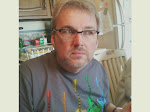When I recently watched the film I Am Legend, I first thought that I would be bored. As likable as Will Smith is, it was beyond my comprehension that I could enjoy just him for an entire feature. After all, Tom Hanks is one of our great American Actors and Cast Away was almost too much.
I then thought that the seemingly infinite commercial appeal of the movie would do me in. I am becoming a cinema snob. If it is too popular, I know I will not like it. If there are too many advertisements for the film on television, it is a sure sign that it cannot be worth watching. But I went, kicking and screaming, to see this little post-apocalyptic, science fiction thriller.
Finally, I almost came undone at the sight of the first 'dark-seekers.' The dark-seekers are mutant-zombie creatures who were once humans. They exist in Will Smith's world only to hunt, capture and eat flesh and blood. I do not, I repeat, I do not like computer-generated, mutant zombie movies. I want to see a film that will move me. Zombies tend to bore me.
But I kept watching. I watched because the story intrigued me. Smith plays an army scientist who is charged with solving a problem. Three years in the past a virus was developed that would defeat cancer. However, there were drastic and devastating consequences. The virus got out of control and killed everyone. Everyone was killed except for the zombies who were damaged and changed by the virus and Smith, who is somehow immune to the killing properties of the virus.
That brings us to Smith's current dark situation. He is the only human left, so far as he knows, yet he still feels responsible to solve the riddle of the virus. He hunts, traps and experiments on all sorts of animal, including zombies. He has a regimented lifestyle and lives in a bunker mentality to protect himself from the zombies, who only come out at night.
But there is one telling scene (or two) near the end of the movie. I will do my best to give you the gist of this without spoiling the finale. There is a scene in which more survivors are discovered. One asks Smith as to why God would punish humanity this way. Smith replies in a way that is typical of the current secular mindset in our world and society. "God didn't do this. We did this."
This is not an atheistic ideal. This is a widespread, widely-held humanistic doctrine. It holds that although there may be a God, that God is uninterested in humanity and human problems. And even if he was interested, humans do not really care about God.
As I witnessed this scene, I was struck by the futility of it all. Why bother? Why would Smith's character, the only human in the world, so far as he knew, care if there was ever a cure for the virus? After all, it was too late. There was nothing to live for.
Finally, be on the lookout for a brief image at the very end of this movie that will renew your hope in humanity. The filmmakers left a clue that the Smith character's attitude is not necessarily the one that we are to leave the theater with. There is hope. There is God. There is a future, and apparently God cares about how we experience that future.
Thursday, January 10, 2008
Subscribe to:
Post Comments (Atom)



No comments:
Post a Comment